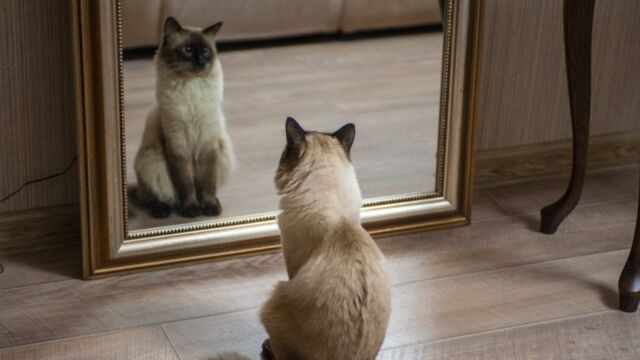Does your cat recognise itself in the mirror?

Cats seem to be attracted to mirrors. But it's a bit of a mystery what they actually see and how they interpret it. Here is what we know about whether cats find themselves or another animal in their reflection.
If you have ever caught your catin front of the mirror, you’ll agree that their reaction is difficult to interpret. Whether they are clever enough to realise it’s a reflection of their gorgeous selves or find another feline staring right at them - let’s find out.
Discover our latest podcast
While there are no definitive answers, scientists have taken a closer look at cat behaviour and how they perceive their own reflections.
More under this adMore under this adSelf-recognition

Self-recognition through a mirror is actually a complicated aspect of cognition. It’s something psychologists have been studying for years in both humans and animals.
More under this adMore under this adAnimal psychologist Diana Reiss said:
It takes a good deal of sophisticated integration of information about yourself and your own movements and what you’re seeing in front of you in that glass.
Self-recognition is all about your ability to see yourself as an individual. It’s a kind of inner knowledge. Humans are not born with it and only get it by the age of 18 months old.
More under this adMore under this adWhat about our feline sisters and brothers?
Do cats understand mirrors?
The most well-known study on animal self-recognition through mirrors took place in the 1970s by psychologist Gordon Gallup. Researchers observed several species of animals to determine which, if any, could look in a mirror and see themselves.

Researchers placed an unscented red dot on their forehead and then placed them in front of a mirror. They watched for signs that the animal noticed the change in their appearance which would indicate they had a sense of self-recognition.
Very few animal species passed the test. Asian elephants, great apes, dolphins, and magpies are all on the list of species that most likely have self-recognition. Cats, however, didn’t make the cut.
More under this adMore under this adGallup’s experiment, along with others that are similar, suggests that cats don’t understand mirrors in the way we do. These studies, of course, are far from conclusive. There’s always the chance that cats see themselves in the mirror and simply don’t care that they have a dot on their forehead.
There’s also the theory that cats don’t act as they recognize themselves because their primary sense isn’t their vision, but their sense of smell. Cats know their humans and fellow pets not so much by looking at them, but by smelling them. Everyone has a unique scent, and scent can be a much more reliable identifier.
More under this adMore under this adSo do they see another cat in the mirror?
So, if cats don’t see themselves in the mirror, what do they find there? Countless cats have at least some kind of reaction when they look at their reflection.

A lot of clever cats will try and look behind the mirror or off to the side as if expecting it to manifest into another cat. Others show defensive behaviours. This suggests that while they probably don’t recognize themselves, they likely spot a fellow feline—or at least another animal.
Knowing cats' dismissive attitude, it can also be so that they see the reflection, but decide to not pay attention. It doesn’t smell like another animal, it isn’t reaching out to grab them, therefore it’s not a threat.
More under this adMore under this adSources used: